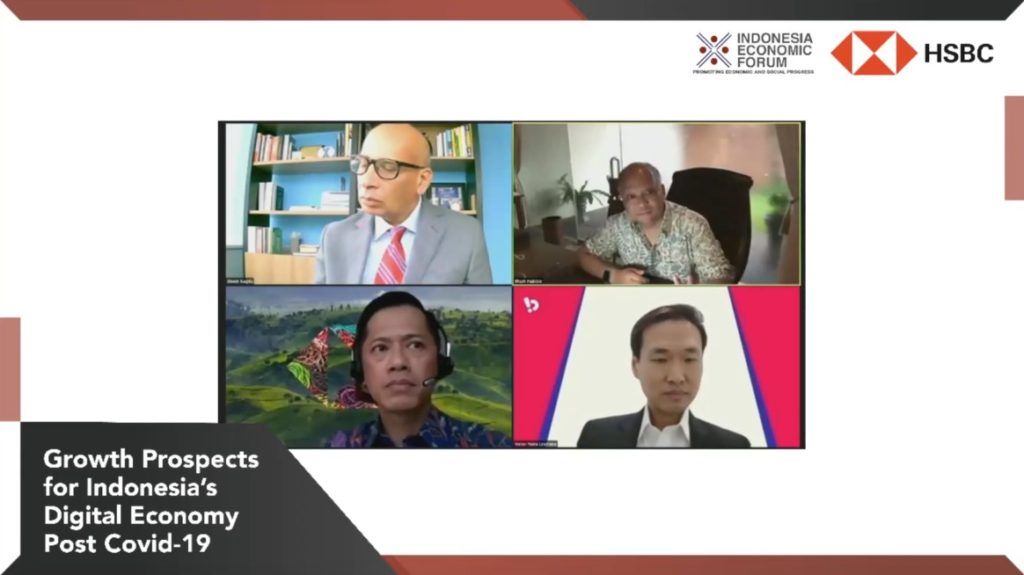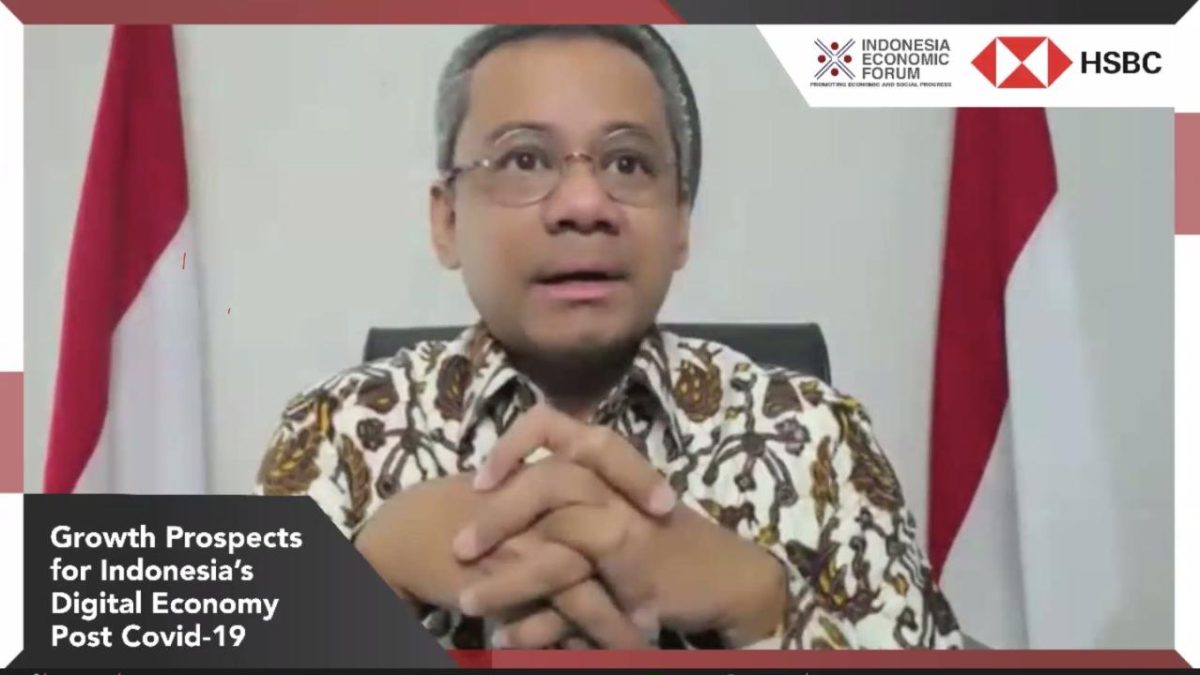Digital Transformations Becoming The Key for Post Covid-19 era
Jakarta, 5 November 2020 – Indonesia’s digital economy has emerged as a key driver of GDP growth.
Over the past two years, digital transactions have grown by a factor of times 10 in most categories. This growth has been partly accelerated by the Covid-19 pandemic as consumers and businesses have adopted greater use of online technologies to work, shop, learn and even pay bills.
Indonesia’s digital economy, according to McKinsey & Co will unleash USD$150 billion in new economic value by 2025. That is 15% of today total GDP. No other sector is poised to grow as fast and move the needle that much. And we can proudly say that Indonesia is home to the largest number of unicorns and Decacorns in SEA. Indeed Indonesia has the one of the highest number of start-ups in the world.
The Indonesia Economic Forum in partnership with HSBC Indonesia held a Roundtable titled “Growth Prospects for Indonesia’s Digital Economy Post Covid-19” which was hosted by Shoeb Kagda, Founder & CEO of the Indonesia Economic Forum, and attended by several keynote speakers such as Deputy Minister of Finance of Indonesia, Mr. Suahasil Nazara; Director of Commercial Banking, HSBC Indonesia, Mr. Eri Budiono; Chief Executive of the National ICT Council (WANTIKNAS) Dr. Ilham A Habibie and Director of Fintech, Payment, Logistics & Bukalapak Mr. Victor Lesmana.
Various sub-topics were discussed at the roundtable, such as: Investing in Digital Technology: How IoT is changing the manufacturing sector; Big Data and AI: the transformation of the services sector and regulatory challenges to digital transformation.
Shoeb Kagda, Founder & CEO of the Indonesia Economic Forum started the discussion with his thoughts on the digital economy that is becoming mainstream across Indonesia.
Much of 2020 has been dminated by the economic and social impact of the Covid-19 pandemic. But beyond the headlines, the digital economy is transforming our lives. Today hundreds of thousands of Indonesians are able to start a business in their homes. support their families and improve their lives. Many of these entrepreneurs are women, who have used the access afforded by the internet to achieve financial independence. Indeed the financial sector has been one of the biggest beneficiaries of the digital economy. New payment gateways and fintech companies have allowed millions of Indonesians who were previously locked out from access to capital to borrow funds to grow their businesses. Traditional banks have extended digital services to their customers and it is possible that in the future, brick and mortar bank branches will become less critical.
There are 64 million micro, small medium sized enterprises in Indonesia. They employ 97% of the nation’s workforce and contribute 57% of real GDP. Unleashing their creativity, productivity and entrepreneurship is Indonesia’s pathway to sustainable and equitable growth. Getting there, however, will not be easy, nor is it a given. To fully benefit from the new digital age, the country must invest and build its ICT infrastructure and modern technology. This is critical if we are to expand access to the internet beyond the large urban areas and t boost business efficiency and productivity.
Deputy Minister of Finance of Indonesia, Suahasil Nazara emphasized two factors in his remarks. Firstly, the government is not only using fiscal policy to support those impacted and just pass through this pandemic but is using the opportunity to implement structural reforms with an extraordinary policy.
Since the first positive case of Covid-19 occurred in March, the government has foreseen that the economy will be depressed as household consumption and investment slowed down in line with limited public interaction. This is reflected in GDP growth, which contracted 5.32% in the second quarter of 2020. To counter this trend, the government intervened through fiscal policy to prevent a deeper economic deceleration. As of July and thereafter, community mobility has become evident, which is the basis for the recovery of Indonesia’s economic activity. The Central Bureau of Statistics announced on November 5th that Indonesia’s GDP growth contracted 3.49% in the third quarter, better than the previous quarter. Eventhough it is still experiencing a contraction, the government hopes that Indonesia’s economic growth for the whole of 2020 will be around minus 1.7% to 0.6%.
“I believe the fiscal policy response from the government, including a reduction in the corporate income tax rate (PPh) from 25% to 22% and later to be reduced to 20%, could attract more private companies to invest in Indonesia. We are also committed to implementing the UU Omnibus Cipta Kerja (Ominnus Law on Job Creation) amid the pandemic, so that investments could improve and at the same time to establish more employment and protect our workers. This will form the basis of the government’s structural reforms. We are committed to persist on carrying out the structural reforms,” said Suahasil.
In 2020, according to Presidential Decree No. 72/2020, the government will continue to increase its expanditure. As such, the APBN (budget) deficit in 2021 is estimated to exceed 3% of GDP, to be precise 5.4% (compared to 6.34% in 2020), and will gradually return to normal levels below 3% of GDP in 2023. The government will increase spending on the health budget, assistance to MSMEs, and improving the readiness of ICT and digital infrastructure in Indonesia. Health is an important sector and offers great economic potential and is the basis for other sectors to recover from the Covid-19 pandemic.
“Internet, data, and gadget connectivity will be very important. That’s why we allocate internet subsidies. The improvement of ICT infrastructure is also important to increase Indonesia’s total labor productivity. That is why in 2021 the government budget allocation for ICT will increase and will be allocated through transfers to regions and several ministries such as the Ministry of Communication and Information for satellite connections, the Ministry of Education and Culture for student internet subsidies, and others, the Ministry of Social Affairs, the Ministry of PPN and the Ministry of Finance itself. We are currently upgrading the tax core system to make it more user friendly and provide easy access and certainty for taxpayers,” added Suahasil.
Closing his remarks, Suahasil emphasized the importance of digital transformation for the Indonesian economy going forward. “This is part of the “agents of change” and must be inclusive of every Indonesian citizen so that all of them can help each other improve the Indonesian economy and be able to increase security for digital transactions, data, and digital security, and others. The digital economy will become one of the economic sectors that will be fundamental to life after Covid-19 in the next 2 to 3 years. Especially if other important sectors such as agriculture and processing can also adopt digital transformation, the impact will be even greater. On the other hand, telecommunications is also one of the fastest-growing sectors at present and perhaps in the next 2 to 3 years because public dependency on telecommunications service providers will increase,” he added.
The financial sector is also one that could maximize the adpoption of the digital economy. The government has always supported the financial sector, especially in increasing financial inclusion and financial literacy in rural communities. Banking and non-banking digital services must ensure that they not only increase the financial inclusion of the population in Indonesia but also at the same time increase financial literacy. OJK plays a role in overseeing governance, data, security, product innovation, and together with the Ministry of Finance it also ensures financial innovation and digital services must run by applicable regulations with due regard to financial system stability.
“The digital economy has developed very fast in the last 8 months and will be our future. In the finance ministry itself, we have switched to digital for our various activities, from administration, meetings, to signatures, all done digitally. Even after vaccines are found and people feel comfortable interacting again and returning to economic activities, I believe digitalisation will remain a part of our new lives,” concluded Suahasil.

Director of Commercial Banking, HSBC Indonesia, Eri Budiono, shared his views on 9 new trends in the banking world in the next few years in the post-Covid-19 era. First, there will be a new economy driven by digital adoption. Second, there is a shift in job roles because Covid-19 has brought a lot of automation. Third, remote working will become the new normal. Fourth, cashless payment will increase. Fifth, disinflation will kickin because many business actors face increasing pressure due to productivity competition and lower prices for consumers. Sixth, more investment will be shifted to technologies to improve connectivity and automation. Seventh, spending patterns on leisure will increase because technology helps people save time doing daily work. Eighth, the challenge in calculating the real level of the economy with the digital economy. Finally, the challenge is in terms of policies that must be agile and adaptive to the times.
In the financial sector itself, the Covid-19 pandemic has forced banks such as HSBC Indonesia to conduct training or rescaling programs for their employees so that they are better prepared for new job roles in the future. Some employees also transitioned to other functions. HSBC itself does not have a CTO to lead digital transformation in the company, but all of them are commanded directly by the President Director. HSBC has also started to increase collaboration with non-banking industries such as fintech firms to develop customer acquisition and business origination.
“We have seen an increase in community mobility activities that have contributed to economic recovery. But there is still much homework that the government has to complete, starting from infrastructure, regulatory framework, and human resources. Maybe with the Omnibus Law on Job Creation, we can employ a few expatriates to transfer their insights and accelerate the increase in digital literacy in society. We must work together to help each other to maximize the digital economy whose ultimate goal is increased productivity, “said Eri Budiono.
Chief Executive of the National ICT Council (WANTIKNAS) Dr. Ilham A. Habibie shared his views regarding the importance of new skills needed to improve human resources such as digital literacy. For this reason, education and training related to problem-solving, critical thinking, programming, and STEAM education are needed. Every human resource in Indonesia needs to open its eyes to training opportunities for these skills. Indonesia also needs to immediately build a data center whether it is in Jakarta, the New Capital, Batam, or Bitung, and put up chief digital officers at the national level such as Singapore, Japan, and the United States. Currently, digital transformation initiatives are still being carried out separately by the respective ministries.
Bukalapak’s Director of Fintech, Payment, Logistics & Virtual Products, Victor Lesmana, also supports the government’s commitment to increasing the digital literacy of the community, especially in tier two or three cities. Bukalapak itself, through the Bukalapak Partners program, moves a lot to small cities by collaborating with MSMEs and introducing them to digital skills to increase their productivity.
“We always look out for technological developments in the next 5 years, compared with today’s technology in the market. We have also build an innovation center for new technologies and act as incubation for digital economy players to implement solutions to real-world problems,” said Victor.

